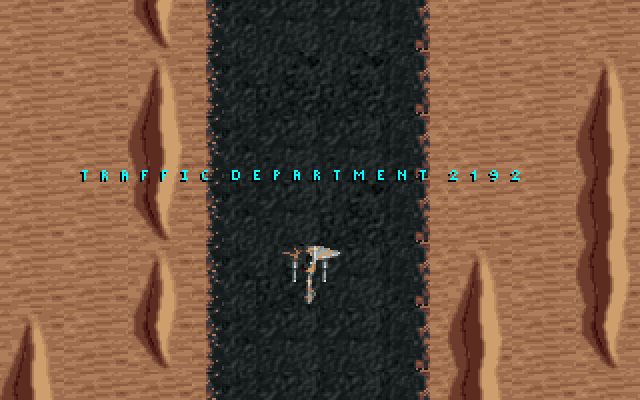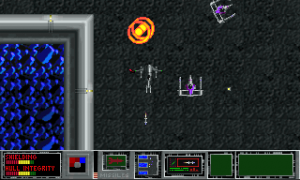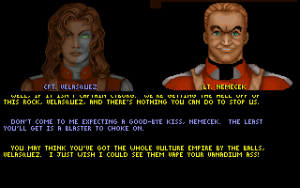Traffic Department 2192 
Traffic Department 2192 is a three-part game, but there’s really only two parts. For the first episode, it’s brash and snappy, an occasionally clever action showcase with a nasty mouth. Then for the remainder of the game, it settles into a groove, losing the constant resourcefulness that made it so interesting. At sixty missions, the game runs probably twice as long as necessary, and its unevenness can probably be attributed to the realities of episodic shareware development. Yet it holds together through these changing styles thanks to its consistent shoot-em-up fundamentals that work even once the splash has worn off.
The game’s three episodes unfold across the desert world Seche (and later its moon Kolor). The planet has been overrun by Vulture, a mob-like gang of “hoverskid” operators who control global trade and media. The last freedom fighters work for, oddly enough, the Traffic Department, a transportation authority with the greatest remaining cache of vehicles, weapons, and skilled pilots. You continue their subversive war as Marta Louise Velasquez – Vel for short – a Traffic Department lieutenant whose father was killed in a Vulture attack.
In each of Traffic Department‘s missions, you receive a new assignment, usually to stop a Vulture patrol or escort a supply truck. Typical cat-and-mouse shooting action ensues at high speeds. Although the limited screen size unfortunately prevents you from flying around too quickly, and a handy compass around your hoverskid points you in the direction of your next target, building tension from the game’s limitations by slowly inching you around the map. It never rises to anything remarkable, but it’s a solid foundation that never wears out.
If the gameplay stays the same the whole way through, that’s a major contrast with the game’s story, which evolves from a war tale to an oversized soap opera overflowing with death and carnage. Dialogue interstitials pop up before and after each mission and are often lengthy, giving the game ample opportunities to tug at the drama. Characters you initially hate turn sympathetic once endangered. Vel ascends the ranks of the Traffic Department as her superiors are assassinated, and by the end of the game, she’s become a half-cyborg planetary ruler who dismantles the Vulture empire. To Traffic Department‘s credit, the progression feels natural and warranted.
One thing that doesn’t really change is how crass it is. Traffic Department prides itself on its coarse script, and although that sounds like it could be fun, the game never knows the right time for it. Every character is exceptionally nasty, but Vel is the worst of all, peppering every line of her gung-ho jargon with threats and sexual insults; most dialogue reads like a conversation from teenagers who have only ever watched Top Gun and Deadwood. That clashes with the rest of the game’s tone, which otherwise defaults to agreeable sci-fi pulpiness.
Eventually, the game reigns it in a tiny amount, wisely leaving behind certain plot threads like allusions to Vel’s adolescent sexual misadventures. Vel spends most of the game threatening people for calling her “Vel,” and by the end, she’s accepted her nickname – but then immediately yells at someone for stuttering. If that’s as mature as she gets, I guess we’ll take it.
The consistent, boilerplate sci-fi tone is what saves Traffic Department in the long run, because after the first episode, the game completely runs out of steam. Owing to the episodic structure of shareware games, most of the budget and variety seems spent in the game’s first section. Settings and characters continues to change as the story progresses, but the game stops introducing new music, cutscenes, or gameplay twists after the initial twenty missions. You encounter almost all the game’s ideas in that first episode. In a few of the early missions, you pilot a helicopter instead of a hoverskid, for instance, and a few other missions expect you to fail for narrative progress. One memorable and surprising mission combines both: your helicopter crashes almost immediately in an act of sabotage! The remaining two-thirds of the game offer nothing close to that. Every other scene is a straight-forward shoot-em-up with minimal variation. Everything lacks punch. The closing scenes resemble a table read. Most disappointingly, the final confrontation against the Vulture leader plays like any run-of-the-mill battle, with no attention paid to the climax of the entire three-part story.
If that early variety was the only thing Traffic Department 2192 had going for it, it would have needed to be significantly shorter. But even while it’s running on fumes, the game still manages it coast on its strengths. The bulk of the game may feel stagnant, but it’s a comfortable rut to fall into. Even those run-of-the-mill battles are still pretty fun, and the pulpy melodrama continues to be engaging if you’ve gotten invested in the characters and ongoing story. The final showdown with Vulture would certainly have benefited from additional punch, but it’s still a suitable ending. The second and third episodes play like an extended riff on the first twenty missions, which, while maybe not quite warranted, is at least enjoyable.
The first episode of Traffic Department 2192 does a lot with its baseline sci-fi action and is worth trying if you’re willing to deal with a few nasty characters. It’s a shame that the later chapters are thinner, probably for structural and budgetary reasons. Think of it as a bonus if you’re a fan of what comes before.
(This article was lightly revised on January 27, 2021.)




You have to give credit to TD2192 for the audacity of such an over-the-top plot. The script makes you groan, but it’s at least memorable amongst other PC games of the era, which had no plot to speak of.
Unfortunately, the gameplay never quite jells. The missions quickly get tedious. It feels like the combat could use another mechanic or two. The ship graphics are a little too large for the good ol’ 320×200 resolution, so you spend most of the game staring at the minimap. I wonder how it would feel if the screen zoomed out as you moved faster.
The soundtrack has to be one of the best aspects of the game–kudos to the composers!
That’s very fair; it’s bit of a juvenile mess in parts, but it’s a memorable juvenile mess. The willingness to destroy its entire cast and setting several times over was one of the things that roped me in, but it feels like it needed an editor to bring out the best sensational parts.
This is a dangerous mindset to leap to, but Traffic Department seems like one of the few games that would really benefit from a do-over. Especially the small viewing window, though I think the unintended tunnel vision effect has some merit (the screen is actually even smaller than 320×200!).
Man, I remember this game well. I got it on a disk of freeware samples a friend gave me in ’98. Every single person in this game is a total, complete dick. Even the protag, who tries way too hard to be edgy and cool. Pile that onto only average gameplay amd it just wasn’t any fun—none of the characters were remotely likeable. That’d be fine, if the game was even okay.